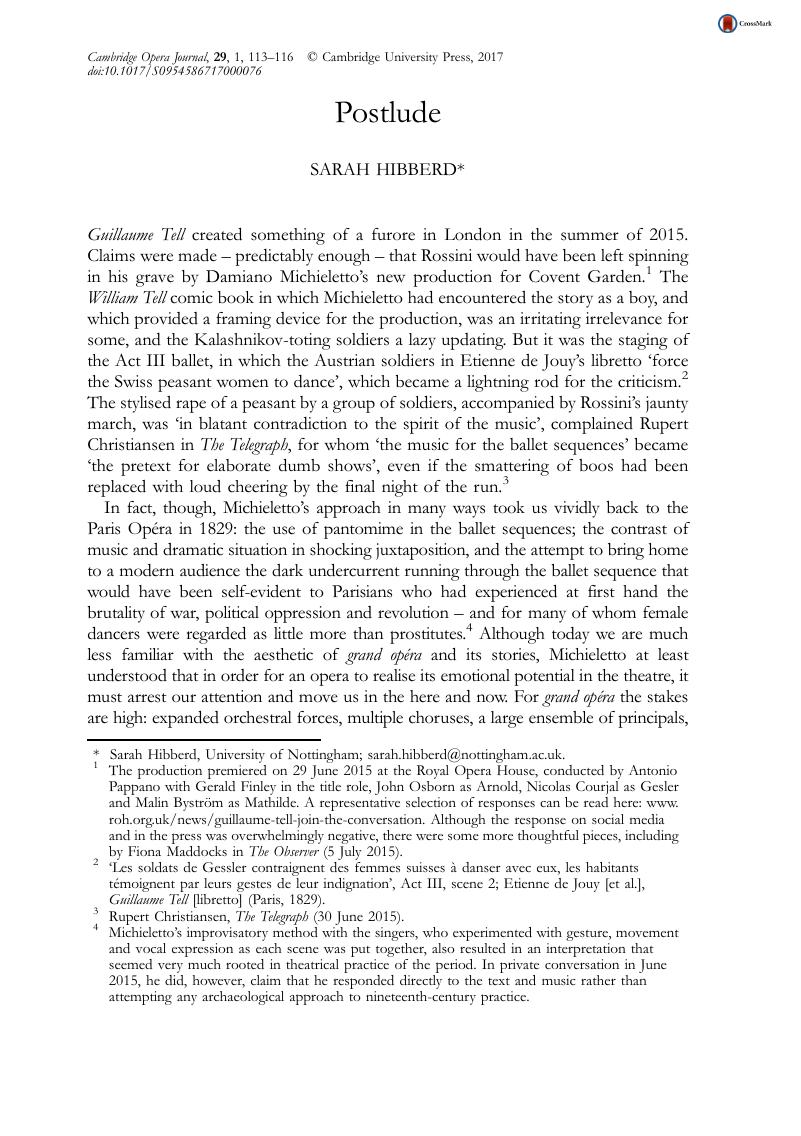No CrossRef data available.
Article contents
Abstract

- Type
- Research Article
- Information
- Cambridge Opera Journal , Volume 29 , Special Issue 1: Nineteenth-Century Grand Opéra on the Move , March 2017 , pp. 113 - 116
- Copyright
- © Cambridge University Press 2017
Footnotes
Sarah Hibberd, University of Nottingham; sarah.hibberd@nottingham.ac.uk.
References
1 The production premiered on 29 June 2015 at the Royal Opera House, conducted by Antonio Pappano with Gerald Finley in the title role, John Osborn as Arnold, Nicolas Courjal as Gesler and Malin Byström as Mathilde. A representative selection of responses can be read here: www.roh.org.uk/news/guillaume-tell-join-the-conversation. Although the response on social media and in the press was overwhelmingly negative, there were some more thoughtful pieces, including by Fiona Maddocks in The Observer (5 July 2015).
2 ‘Les soldats de Gessler contraignent des femmes suisses à danser avec eux, les habitants témoignent par leurs gestes de leur indignation’, Act III, scene 2; Etienne de Jouy [et al.], Guillaume Tell [libretto] (Paris, 1829).
3 Rupert Christiansen, The Telegraph (30 June 2015).
4 Michieletto’s improvisatory method with the singers, who experimented with gesture, movement and vocal expression as each scene was put together, also resulted in an interpretation that seemed very much rooted in theatrical practice of the period. In private conversation in June 2015, he did, however, claim that he responded directly to the text and music rather than attempting any archaeological approach to nineteenth-century practice.
5 Fulcher, Jane, French Grand Opera as Politics and Politicized Art (Cambridge, 1987)Google Scholar.
6 Werner, Michael and Zimmermann, Bénédicte, ‘Beyond Comparison: Histoire Croisée and the Challenge of Reflexivity’, History and Theory 45 (2006), 30–50 CrossRefGoogle Scholar.
7 Meyerbeer is a prominent figure in a colloquy convened by Gooley, Dana ‘Cosmopolitanism in the Age of Nationalism, 1848–1914’, Journal of the American Musicological Society 66 (2013), 523–549 Google Scholar; Gooley, ‘Introduction’, 523–29; and Ryan Minor, ‘Beyond Heroism: Music, Ethics, and Everyday Cosmopolitanism’, 529–34.
8 Cited in Laura Protano-Biggs, ‘An Earnest Meyerbeer: Le Prophète at London’s Royal Italian Opera, 1849’, 57.
9 Cited in Protano-Biggs, ‘An Earnest Meyerbeer’, 57.
10 As demonstrated by Christiansen’s review, cited above. A similar misunderstanding has characterised reception of recent productions of Auber and Meyerbeer, heard as poor imitations of Rossini or half-hearted anticipations of Verdi or Wagner.




